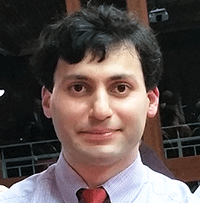The Chebyshev Inequality states that no more than $1/k^2$ of an attribute values of a given sample can be $k$ or more standard deviations away from the attribute mean. Provide an experimental proof of this theorem by generating a sample of 10000 uniformly-distributed random numbers between 0 and 1 and computing the fractions of points that lie at larger distances than $[1\sigma, 1.5\sigma, 2\sigma, 2.5\sigma, 3\sigma, 3.5\sigma, 4\sigma]$ is less than or equal to $[1, 1/1.5^2, 1/2^2, 1/2.5^2, 1/3^2, 1/3.5^2, 1/4^2]$.
An experimental proof of Chebyshev's inequality
by Amir Shahmoradi — Last updated:

